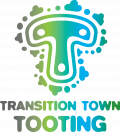Big Business and a Sustainable Future – guest blog by Jacqui Machin
You may have seen in the Lockdown Love series of blogposts that we have been running Tooting Virtual Green Drinks every 2 weeks since lockdown due to Coronavirus, all welcome, join the Facebook Group here. Well, one of those Green drinks was a lively discussion about the role of big business in a sustainable future. Our Tooting professional in the field, Jacqui Machin, facilitated an inquisitive, informative session, quietly interrogating big business and the possibility for positivity. Here’s Jacqui’s blog:
What makes a business good or bad? How does big business impact us in the Tooting community? And what do we want from big business? On Wednesday 3rd June, the Tooting Green Drinks community came together (virtually!) to discuss these questions. I am a Tooting resident and a Green Drinks regular, and I work with big business on sustainability and climate change. I wanted to bring this topic to Green Drinks as although I see lots of overlap between community and business priorities, there seems to be very little dialogue. We had a really lively discussion and it was great to hear so many diverse perspectives – here are just a few of the ideas we talked about.
Big businesses are a deeply embedded part of the society we all inhabit. As individuals, we are their customers and employees, and we might even own shares in them as part of our pensions. They provide jobs and infrastructure to our communities, tax revenues that fund public services, and act as suppliers, customers and competitors to small businesses. Like all parts of society, they also depend on nature, using natural resources and releasing waste or pollution into the environment. In our conversation, people shared their experiences of how big business can play these roles both to the benefit and detriment of society. In my line of work, I have seen that big business has some unique capabilities that mean they could play a crucial role in building the better future that we would all like: they can use their scale, skills and flexibility to help solve global problems, like building huge offshore wind farms, or finding new cures for widespread diseases.
The good businesses that the Green Drinks community identified were those that recognise their footprint and make targets to minimise it, provide a worthwhile product or service, support local suppliers, and respect their workforce. My favourite examples were companies that have decided to completely change what they do in order to be more sustainable and provide something that society needs. In contrast, the bad businesses that were highlighted are extractive, constantly pursue growth, put profits before people and planet, exploit staff and suppliers, and don’t pay their fair share of taxes. Ultimately, it seems that people value similar traits in companies as they value in people – we like those that take responsibility for their actions and treat others with respect; we dislike greed, dishonesty, selfishness and carelessness.
What do we want business to do differently, to help us build more sustainable communities?
At the end of Green Drinks, we thought about this question in small groups, and came up with a wishlist for business:
Do what you do, better!
- Keep innovating so your products get better, and more sustainable, all the time
- Think long-term and account for all the societal costs of the business
- Tell us more about what we’re buying – how did making it affect people and planet?
- Become a B-corp and solidify your commitment to consider the interests of the community and the environment
Localise!
- Get to know the places where the business is present, and value the knowledge of local employees
- Support our community by localising supply chains
Value the people that work for you!
- Focus on employees and empower them to create positive changes
- Fix the ratio between the highest and the lowest paid in the company
- Give sustainability literacy training to all staff, so that people understand the impact of their company
- Have a home-working charter – now we know how many people can work remotely, it’s time to commit to flexibility
How can we make our wishlist come true? We discussed how we can use our purchasing power to support those companies that are doing good things; as employees and shareholders we might also be able to chose to support better businesses and improve businesses from the inside. It can also be surprisingly effective to contact companies directly and ask for changes – you may feel like your email is a drop int he ocean, but I have seen many companies use customer queries to help decide which issues they should focus their sustainability efforts on. At the end of the day, businesses are made of people, and I truly believe that most of those people want what’s best for communities, our planet and for future generations. Many of them will already want to do the right thing – our purchases and our voices can help them make the case for it.
What I will take away from our conversation is that having an open dialogue between the people in business and the people in community (some of these are the same people) is enlightening for everyone, and I hope that conversation continues.


